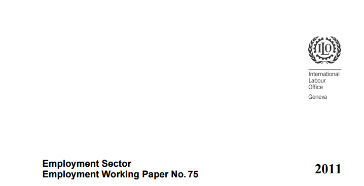Publications on informal economy
-

Publication
Mainstreaming environmental issues in sustainable enterprises: An exploration of issues, experiences and options
21 January 2011
Employment Working Paper No. 75
-
Publication
A study on informal apprenticeship in Malawi
06 January 2011
Employment Sector - Employment Report No. 9
-

Publication
What role for labour market policies and institutions in development? Enhancing security in developing countries and emerging economies
17 December 2010
Employment Working Paper No. 67
-

Publication
Extending the scope of application of labour laws to the informal economy
15 April 2010
Digest of comments of the ILO’s supervisory bodies related to the informal economy
-
Publication
News@ILO, March 2010
01 March 2010
The March 2010 e-newsletter of the ILO in Asia and the Pacific contains the latest news from the regional office, a feature on India's Decent Work Country Programme, a selection of the latest publications, and details of forthcoming events and meetings.
-

Publication
Zanzibar. Social protection expenditure and performance review and social budget
14 January 2010
Zanzibar's lack of social protection has left it vulnerable during the current financial crisis and economic downturn, and basic social services are urgently required. The ILO-DFID funded project sets out the current situation of existing social transfers within Zanzibar's social protection system.
-

Publication
ILO, WTO joint study on trade and informal employment: Globalization and Informal Jobs in Developing Countries
01 December 2009
This study finds that the high incidence of informal employment in the developing world suppresses countries’ ability to benefit from trade opening by creating poverty traps for workers in job transition. It is a product of the collaborative research programme of the ILO International Institute for Labour Studies and the WTO Secretariat.
-
Publication
News@ILO, November 2009
01 November 2009
The November edition of the ILO's Asia Pacific e-newsletter contains the latest news from the regional office, a feature on migration policy in Thailand, a selection of the latest publications, and details of forthcoming events and meetings.
-

International Migration Papers No. 98
Afghan households and workers in the Islamic Republic of Iran: Profile and impact
16 October 2009
This study represents the results of a process of primary data generation through field surveys of Afghan households, establishments employing Afghan workers and Afghan workers themselves, through a collaborative process among national and international experts. The findings indicate the marginal position of Afghan households and workers in the Iranian economy even after decades of stay. Furthermore, most Afghans have had little contact with Afghanistan. While the Iranian authorities maintain that all the remaining Afghans must return to Afghanistan, there are many economic and social impediments to the return of the remaining populations. Increasing restrictions and controls are likely to increase their marginalization without a perceptible impact on prospects for return. The study highlights that continuing international cooperation and bilateral dialogue are essential to sort out the complex economic, social and political issues. Meanwhile, it is necessary to support the improvement of the working conditions for Afghans in Iran, and in general to facilitate their integration.
-

Publication
Globalization and Informal jobs in Developing Countries - A joint study from the International Labour Organization and the WTO
12 October 2009
This study is a product of the collaborative research programme of the International Institute for Labour Studies at the International Labour Organization (ILO) and the Secretariat of the World Trade Organization (WTO). Following up on the joint review of the literature on Trade and Employment, published in 2007, it focuses on the linkages between globalization and informal employment in developing countries. World trade has expanded significantly in recent years, making a major contribution to global growth. Economic growth has not led to a corresponding improvement in working conditions and living standards for many workers. In developing countries, job creation has largely taken place in the informal economy, where around 60 per cent of workers are employed. Most of the workers in the informal economy have limited job security, low incomes and no social protection, with limited opportunities to benefit from globalization. This study focuses on the relationship between trade and the growth of the informal economy in developing countries. Based on existing academic literature, complemented with new empirical research by the ILO and the WTO, the study discusses how trade reform affects different aspects of the informal economy. It also examines how high rates of informal employment diminish the scope for developing countries to translate trade openness into sustainable long-term growth. The report analyzes how well-designed trade and decent-work friendly policies can complement each other so as to promote sustainable development and growing prosperity in developing countries.